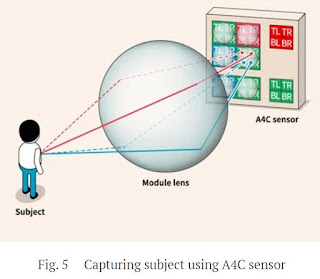"The structure of the A4C sensor is shown in figure 1. Similar to the conventional Quad sensor, it has a photodiode that converts light into an electric current and a color filter that selectively absorbs certain light wavelength. Unlike the Quad sensor, however, its structure is made up of one micro lens on each group of four of the same color of pixels in the top left (TL), top right (TR), bottom left (BL), and bottom right (BR) corners.
Compared to existing PDAF technology, the A4C sensor can calculate disparity at every pixel. It means accuracy is high and that it can secure more than 10 times the accuracy in low-light environment of less than 10 lux. Unlike conventional PDAF technology, which leverages binocular disparity, the A4C sensor leverages the disparity of four pixels on the top and bottom and the left and right corners under the micro lens. Therefore, its focus detection performance of subjects of horizontal or vertical directions is outstanding. Video demonstrates the performance gap between a conventional AF and A4C AF."





They had better respect prior art.
ReplyDeleteThis is the problem I have always had with patents and prior art... this is just obvious to anyone of ordinary skill in the art. I really do hope that there are no patents on this that would stand up to any Post Grant Review. Many patents are granted (a good patent attorney can structure claims such that a patent on the wheel would be granted), but they really aren't worth much until they stand up to litigation.
Deleteis it different to 2x2 OCL from Sony?
ReplyDeleteIt seems to be the same as Sony 2x2 OCL, Canon's QPAF patents etc...
Delete